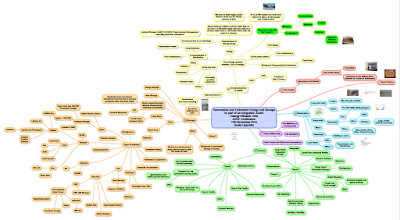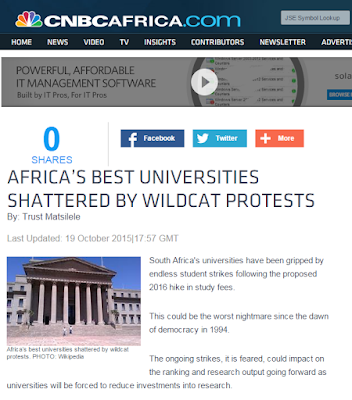On Thursday 1st October,
World-renowned French economist Thomas Piketty
, who gave the annual Nelson Mandela Foundation lecture, said
that South Africa should have
a
wealth tax!The South African tax payer (rich person and corporate) is already paying more than they should for electricity, water, sewerage, rates, petrol, etc, to cross-subsides the poor
(non-
taxpayer
)
.If our government wasn't wasting money, then perhaps more tax and a higher VAT rate would help, but Medupi Coal Power Station should have cost R79 billion and is currently costing in excess of R150 billion.
It is also five years behind schedule. And up to one million people would have jobs if Medupi was complete, and they would contribute massively to tax income in South Africa.
Furthermore, the loss of income for Eskom not being able to supply electricity is R2 million per hour, and assuming that 1/3rd of the revenue is
vat
able, then the VAT revenue
loss
is about R90,000 per hour.So let's focus on where we can earn and save the most and stop taxing the rich.
For every hour that Medupi is late, it is costing the country R2 million, just in electricity revenue, and it is currently costing the country 15% of its GDP. 15% of South Africa's GDP is R84 million per hour!
Another reason the Gini-coefficient (the measure of the wealth gap) is getting bigger is because of South Africa's grant policy where it is easier for people not to work and receive free (already paid by the rich) education, health benefits, electricity, water, subsidised transport, retirement income, training, subsidised food (e.g. non
vat
able items) etc.Poor education means that school leavers cannot find jobs in a technical world.
And this 21st Century world is "flat" (see Thomas Friedman's book "Hot, Flat and Crowded"), where is easy for anyone even far from the grids to compete as long as they have technical knowledge and an internet connection.
Off-grid electricity is easy now with renewable energy and so rural Indians and others can find work all over the world, with a laptop, renewable energy, a satellite dish, and an internet connection. They are also healthier than city dwellers with less pollution, less polluted minds, healthier bodies, and a better ability to get the job done.
And South African miners go on strike so often that it is becoming easier not to mine! For example, to use renewable energy, and other man
-
made alternatives to the stuff that comes out of the ground!One reason the Rand is depreciating so quickly is because our inflation is probably amongst the highest in the world. A reason for this is because the rich get 15% increases per annum in taxation (electricity, water, etc), whilst the poor get 0%. This makes it easy to fiddle the inflation numbers. Zero Rand for 18 million people receiving grants + 15% increases for 3 million taxpayers and one can see the problem.
So:
- we need much more efficient use of our existing taxation
- we need our new power stations to be completed
- we need people to be employed and to start paying tax and VAT
- we need an education system that works and produces 21st century minds, not 19th century minds, and
- we need an elimination of huge wastage, especially wastage in electricity provision, in infrastructure, in our national airline, and an elimination of corruption in government and business.
And we definitely do not need another wealth tax!
Yours faithfully










